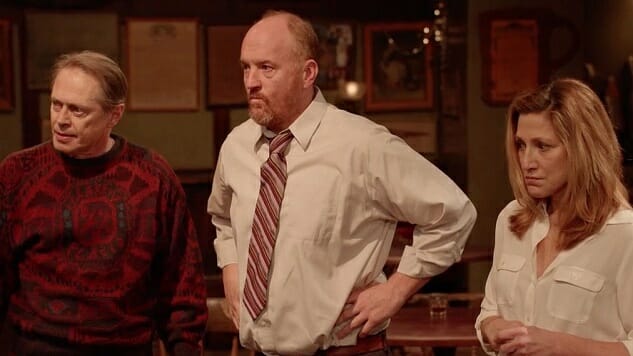
When an email from Louis C.K. popped up in my inbox on January 30th, announcing, as plain as can be, “Horace and Pete episode one is available for download,” I did exactly what the man behind both the message and the new show did and did not want me to do. I quickly plunked down $5 and downloaded the hour-long show without a second thought. But then I waited a couple of days to hear what some journalists had to say about it.
In another email, sent out about five days later, C.K. explained that it was an experiment. Something like his decision to cut out all the middlemen and fund the filming of a stand-up special that he would then sell on his website. In this case, it was a TV series that C.K. paid for out-of-pocket and dropped into the world without warning and, as he put it, “without the usual promotion, banner ads, billboards and clips that tell you what the show feels and looks like before you get to see it for yourself.”
For the hundreds of people uploading their web series to YouTube and Vimeo every day, this isn’t an unusual practice. But for an artist of C.K.’s stature, it’s pretty amazing to watch him put his neck and bank account on the line like this. Mostly the latter, considering the talent he was able to pull to be part of this new series: Jessica Lange, Steve Buscemi, Edie Falco and Alan Alda are all in front of the camera, and the show’s lilting theme song was written and recorded by Paul Simon. No doubt he could have called on his many comedian buddies to fill these parts, just as he has done for five seasons of Louie (and there are a few, with Steven Wright taking up a barstool next to Kurt Metzger). The gravitas of this story required some actors with a little more dramatic chops. His willingness to pony up for their time—and their willingness to take part in this—is a swing for the fences that few other artists would dare unless they had some corporate money to cushion the blow.
If you don’t already know, the other reason to call in the big acting guns is that, although it has the look and feel of a traditional three-camera sitcom (and is set primarily in a dive bar), Horace and Pete isn’t really a comedy. There is some juvenile joy in hearing Alda in his role as a grizzled barkeep spewing vitriol, punctuated with racial epithets and slurs against gay men, or the cameo appearance by Maria Dizzia who plays a woman with Tourette’s that visits the tavern in the second episode. Otherwise, this brilliant new venture is a wallow in some of life’s harshest realities.
During the first hour alone, Horace (C.K., at his rumpled, dejected best) struggles to maintain a relationship with his grown daughter (a never better Aidy Bryant) and then closes out the episode by asking his live-in girlfriend (a brief turn by Rebecca Hall) to move out. Swirling around his personal maelstrom are Pete (Buscemi), his older brother who spends nearly the whole inaugural episode withdrawing from his antipsychotic meds, and his sister Sylvia (Falco), who insists, as legal co-owner of the bar, that they sell the dump and move on. Through their conversations, old wounds are reopened, family secrets bubble to the surface, and plenty of mud gets slung. Not for nothing do the acknowledgments that end the closing credits include British filmmaker Mike Leigh, as this show, so far, is of a piece with some of his most poignant and devastating work like Secrets & Lies or Abigail’s Party.
Outside of the apparent complaints that people have been lodging over the cost of the first episode, what will potentially turn viewers off is the fact that, quite unlike Louie, there are scant few moments of levity or lightness throughout these two hours. You see glimpses like Horace’s wobbly soft shoe through the bar as he gets ready to open for the day, or the unusual sexual fantasy he has surrounding Marcia, the barfly that was his dad’s lover before his death. But even a drama as lauded as Transparent or Mad Men had moments of pure comedy to balance out the tension and crises.
The biggest element of this Horace and Pete experiment was really C.K. proving that he could write and produce a compelling kitchen sink drama with zero intervention from outside sources. This might be raising some eyebrows at FX corporate offices, but for those of us who put the full weight of our trust in his talent and vision, this just solidifies our feelings.
This also proves that C.K. can write something outside of his own life and still have it be affecting. There are some themes that connect this with Louie—the distant, uncaring father figure, in particular—but otherwise this is fully removed from its creator’s real life and real experiences. That simply means we can’t hold it at a distance either, or view it somewhat ironically. C.K. wants to land a blow to our systems here.
Horace and Pete might also be something of a calling card for C.K. In past interviews, he has talked about the possibility of getting back into making movies, saying that what is stopping him is that he needs a studio to give him a blank check and then leave him alone. No notes, no audience reaction screenings, no worried executives on set. Once he wraps up this new venture, he has the glaring evidence to show what one driven visionary can accomplish if given complete artistic control. All that’s left now is to wait for someone to let C.K. loose on an even grander scale.
Robert Ham is a Portland-based freelance writer and regular contributor to Paste. You can find more of his writing here.